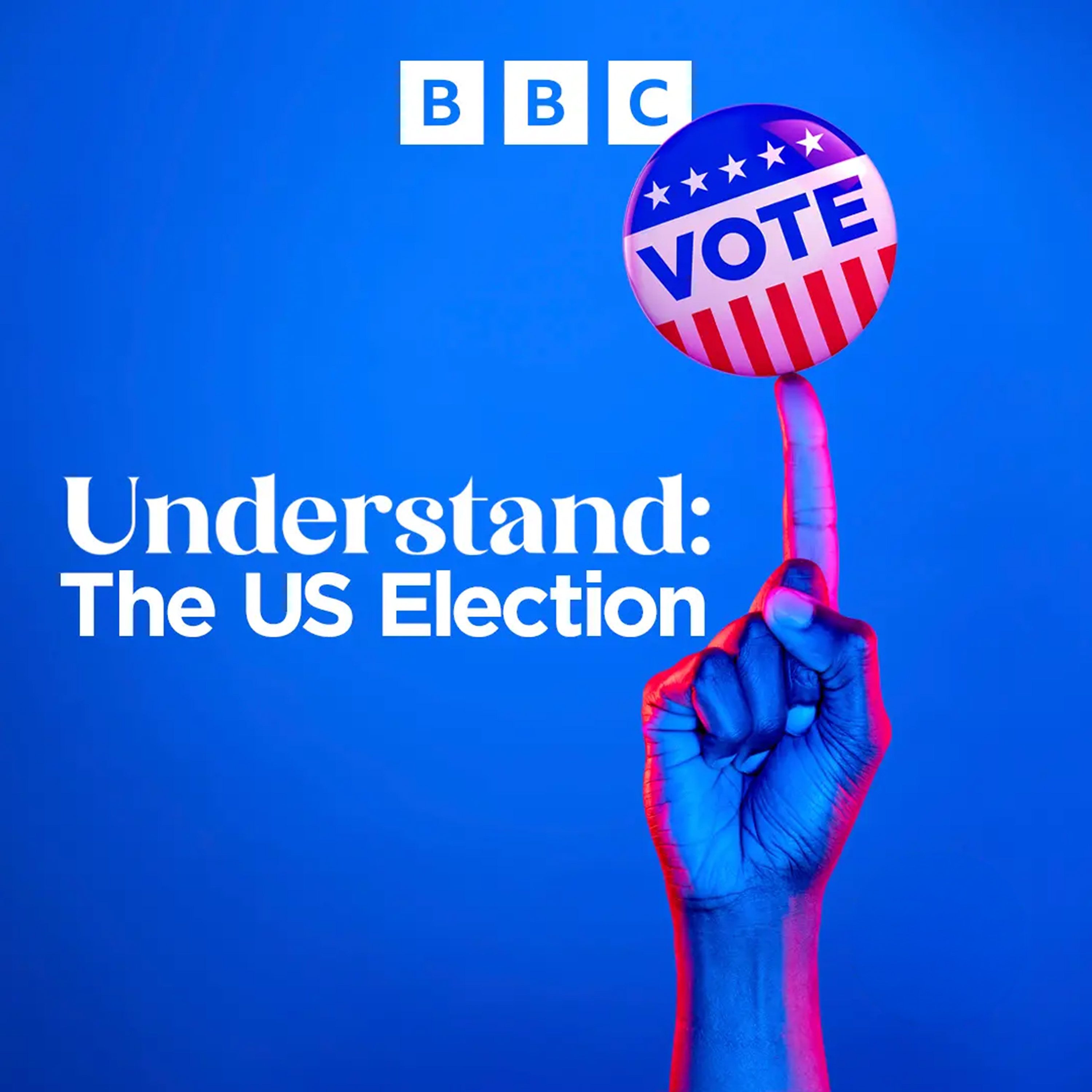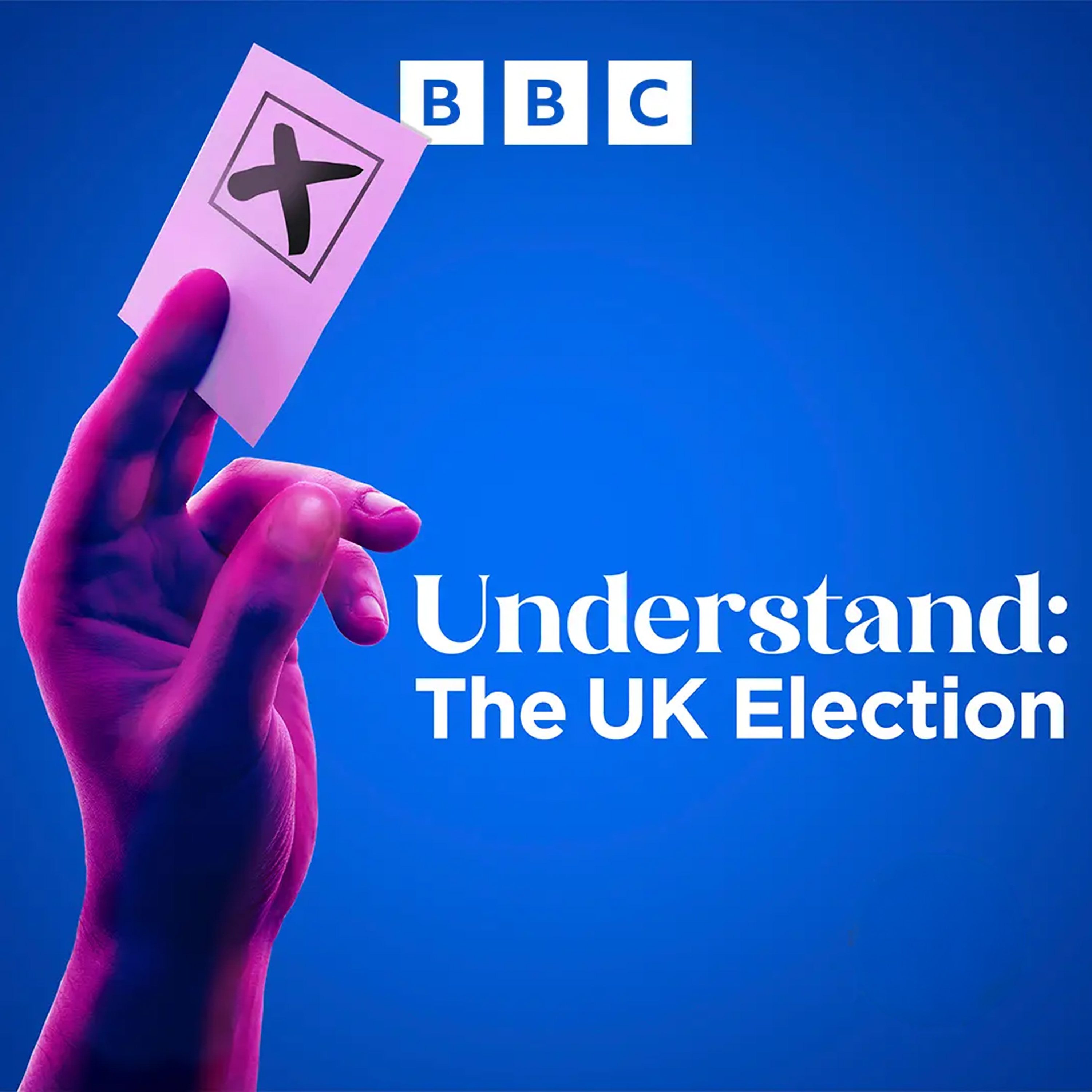The US Election: 2. The Campaign Trail
Following on from part one, which explained how the candidates are selected, part two looks at what happens on the campaign trail - and who's paying the bill?
Press play and read along
Transcript
Speaker 1 This BBC podcast is supported by ads outside the UK.
Speaker 2
Elite basketball returns to the Elite Caribbean destination. It's the 2025 Battle for Atlantis men's tournament happening November 26th to 28th.
Don't miss hometown team St.
Speaker 2 Mary's, along with Colorado State, Vanderbilt, Virginia Tech, Western Kentucky, South Florida, VCU, and Wichita State, playing 12 games over three days.
Speaker 2 It's basketball at its best, plus everything Atlantis has to offer. Aqua Venture Water Park, White Sand Beaches, World Class Dining, and more.
Speaker 2 Get your tickets and accommodations at battleforatlantis.com.
Speaker 3
A happy place comes in many colors. Whatever your color, bring happiness home with Certopro Painters.
Get started today at Certapro.com.
Speaker 3 Each Certapro Painters business is independently owned and operated. Contractor license and registration information is available at Certapro.com.
Speaker 4 BBC Sounds, Music, Radio, Podcasts.
Speaker 5 Hello, and welcome to Understand the U.S. Election, your essential guide to how the next American president will be chosen.
Speaker 5 In a year in which all manner of surprises and twists are in store, we want to bring you a kind of template, a model of what is meant to happen, how the candidates are selected, what happens on the campaign trail on election night, during the inauguration and beyond.
Speaker 5
And we'll have a few lessons from history along the way. My name's Justin Webb.
I'm one of the hosts of AmeriCast, our BBC sounds podcast in which we cover American politics and life.
Speaker 5
I was the BBC's first North America editor back in the distant past when Barack Obama was president. But I still know the place well.
I have a child born there too, a U.S.
Speaker 5 citizen by birth, who will be voting in her first presidential election this year.
Speaker 5
Today we are chatting about the campaign trail. One of my guests is my fabulous AmeriCast co-host Anthony Zurker, the BBC's North America correspondent.
Howdy Anthony.
Speaker 6 Hello Justin, it's great to be here.
Speaker 5
And my other guest is Mary Frances Berry who is professor of American Social Thought, History and Africana Studies at the University of Pennsylvania. Dr.
Berry, hello to you.
Speaker 7 Well, thank you. Thank you for having me.
Speaker 5
So on the last episode, we found out how the presidential candidates for each party are selected. Now, the fight for the White House moves upper gear.
So first question to you, Anthony.
Speaker 5 What are we actually talking about when we say the candidates are out on the campaign trail?
Speaker 6 Well, what it means is that a candidate and their campaign staff and volunteers get out into the states that are battlegrounds, meet with voters, interact with voters, and try to convince them to give them their support.
Speaker 6
It is a series of events. There could be rallies like Donald Trump had in 2016.
There could be town hall forums like Bill Clinton in 1992 made famous, sitting down and meeting with voters.
Speaker 6
It can be going door to door and knocking on doors even. It can even be smaller events.
It can be showing up at the Iowa State Fair.
Speaker 6 All of this is part of being out there, meeting voters, debating with other candidates, and pressing the flesh.
Speaker 5 Anthony, how much does it all cost?
Speaker 6 It costs... hundreds of millions, even topping a billion dollars to run a modern American presidential campaign.
Speaker 5 Dr. Barrett, where does the money come from?
Speaker 7 The financing of campaigns requires an enormous amount of money, too much in my opinion. A lot of it comes from small donors.
Speaker 7 The importance of small donors is a candidate thinks that they're proving that they are a man or woman of the people if somehow they get donations from individual people in small amounts.
Speaker 7 But in the states, we have a limit on how much small donors can give.
Speaker 7 And a huge amount of it comes from corporations. We have something called PACs, political action committees, and then they funnel the money into the campaign, which we all call dark money.
Speaker 7 You can give that money to the PAC and no one can find out who put the money in the PAC or what companies put the money in the PAC. So it's corporate driven.
Speaker 7 These huge chunks of it come from corporations and other kinds of interests.
Speaker 5 Right. You've got on the one hand the presidential campaigns themselves raising this money and then on the other hand these PACs.
Speaker 5 And Anthony, when they amass this huge sum of money, whether it's in a PAC, a political action committee, or in the candidates' own coffers, what do they do with it?
Speaker 6 Well, it gets on a lot of different things, but one of the big chunks is television advertising. Television advertising is incredibly expensive, particularly in highly populated states.
Speaker 6 But they also spend it on grassroots activism, where they help organize volunteers to get get out and do that door-to-door knocking and pamphlet handing out all of that.
Speaker 6 There are other media outlets that they can use advertising on such as radio and newspapers and more and more now the internet. They can spend it on candidate travel.
Speaker 6 So you have that candidate on the campaign trail bouncing around from state to state, making public appearances and also the infrastructure that goes behind that kind of campaigning.
Speaker 6 So organizing a venue for a rally, renting out the space, getting the logistics all taken care of, the lighting, the balloons, and everything else that goes into pulling off one of these big campaign events.
Speaker 6 But I will re-emphasize television, at least traditionally in the modern era, takes up a huge chunk of what campaigns spend.
Speaker 5 And you say bouncing around from state to state. It's not every state, is it? Explain that.
Speaker 6 Not every state. Actually, presidential elections these days have come down to just a handful of what are called battleground states.
Speaker 6 Those are the states that are very close on a razor's edge between tilting towards Republicans or Democrats.
Speaker 6 And it can be much more wise for the candidates to invest their resources there where they can make a difference and win the state. This is where the election is going to be decided.
Speaker 5 And if we look at the battleground states, the likely states that really count this time round, do we already know where they're likely to be?
Speaker 6
Absolutely. They've shifted a bit over time.
But the battleground states this time around are Wisconsin, Michigan, Pennsylvania in the Midwest, New Hampshire in New England.
Speaker 6 In the south you have Georgia and North Carolina. And in the West you have Nevada and Arizona.
Speaker 6 Now notice I didn't say Florida in this list and Florida used to be the key battleground state in the 90s and 2000s, but Florida is one of those ones that is shifting away.
Speaker 6 It's becoming more reliably Republican, particularly in this case if someone like Donald Trump, who lives in Florida and has strong ties to that state at this point, if he's on the ballot.
Speaker 6 You may not think of looking at me, but I've been around covering politics for quite some time. And actually, battleground states have changed considerably over time.
Speaker 6
I remember back in the 80s, California used to be a battleground state. Now it's not.
It's decidedly Democratic-leaning. You're not going to sit there paying attention to California or New York.
Speaker 6 It's going to be in these handful of states where the election is going to be decided, which kind of simplifies things for political reporters like us, but it also means that a lot of Americans are on the outside looking in when it comes to picking a president.
Speaker 7
If I may interrupt, what Anthony is saying is that some states just get ignored. Okay.
You can count on nobody coming in your state to campaign.
Speaker 7 If you're a state where you're either distinctly red, distinctly blue, as we say, and then you don't have to worry about them coming back there. The contestation is in other places.
Speaker 7 And that contributes increasingly to the sense in some states that the politicians don't care about them.
Speaker 7
And this alienation that we have, as everyone keeps talking about, is a big problem in American politics, politicization. They don't notice me.
I'm too small. Nobody even comes here.
Speaker 7 If you're out in one of those states in what we call flyover country, they used to call it that in the middle of the country.
Speaker 7 And you are not a state that's in contention, you'll never never see anybody.
Speaker 5 Dr. Berry, the candidates also choose not just between states, but between blocks of people, don't they,
Speaker 5 to appeal to?
Speaker 7 Candidates have what they think is their constituency, which they can count on every time. And in that constituency are blocks of people.
Speaker 7 For example, when women got the right to vote, people first thought that women were all just going to vote like their husbands and we didn't have to pay attention to them, pay attention to their husbands.
Speaker 7 And then later on, we found in a few years that women had some ideas of their own, and they became sort of a block.
Speaker 7 When, in fact, black folk could not legally vote in a lot of places, then they were not a constituency that, depending on the election, you would be worried about.
Speaker 7 But when the right to vote came along, they pay attention to you when you vote as a block and when you adhere to one party, like blacks who did vote, voted for Republicans before Roosevelt became president.
Speaker 7
And then after that, and even now, blacks have been a consistently loyal constituent of the Democratic Party. But that's all changing.
That's all shifting for this election cycle.
Speaker 7 So you pay attention to the people who can vote, who have voted for you before, and anybody who's newly coming in, like new immigrants and people like that, when they get the right to vote.
Speaker 5 Dr. Berry, can we dive into history for a moment?
Speaker 5 Sure. Tell me about a moment where something has happened on a campaign trail that has really mattered, that has really changed the race.
Speaker 7 Well, I think that when Jimmy Carter ran for president, he was known by everybody,
Speaker 7 you know, the governor of Georgia, and he went all over Iowa and went everywhere and he would say, well, I visited every place.
Speaker 8 There were no reporters, no cameras, no Secret Service nearby when Jimmy first walked up and introduced himself to countless voters. This style was unheard of for a presidential hopeful.
Speaker 8
But for Jimmy Carter, there was no other way. Jimmy Carter from Georgia.
I hope to be the next president.
Speaker 7 You know, it's just like in the recent campaign where DeSantis, I guess he says he's going there, all 90 counties. I don't know if he's been there yet, but he said he was going to all the 90 counties.
Speaker 5 Right, and you've given us a bit of history there and a bit of modern day, too, because you're referring to Ron DeSantis, the governor of Florida, who's, of course, running for the Republican nomination and is currently doing exactly what you describe out there in Iowa.
Speaker 8 And so he traveled to the towns, the cities, to the meeting halls and factories, the supermarkets and sidewalks, talking to people.
Speaker 5 So that's how Jimmy Carter's campaign for the nomination, 1976, set a precedent for what we're seeing today.
Speaker 8 Gradually he began to close the gap between Jimmy Carter unknown and Jimmy Carter a candidate to be considered.
Speaker 5 Back to today, Dr. Berry, we were talking earlier about the groups of voters that the candidates appeal to.
Speaker 5 Black voters, Hispanic voters, other demographic groups, racial groups, but also social groups more widely. What are the key groups this time round in 2024?
Speaker 7 Well, for the Democratic Party, aside from the consistent voters that they can count on no matter what happens, which happens with every party, there is a lot of contestation about the votes of Latinos, who who some people call Hispanics, I don't know what you call them, Britain, but about the votes of Black people.
Speaker 7 There's been a lot of analysis that says a lot about to stray to the Republicans or something. And the women's vote is a focus.
Speaker 7 Campaigns do direct their attention at constituencies, but they have problems.
Speaker 7 Take the whole Palestinian-Israeli question.
Speaker 7 You want to craft a message that will keep you on the right side of most of your constituency and the one you can attract at the same time that you don't lose anybody.
Speaker 7 And this is a very tricky proposition. So that's what you do in terms of demographies.
Speaker 7 If people can vote, whether they're new to voting or whether they've been around a lot, what the issues are and whether you can count on them or not count on them and what you have to do in order to count on them.
Speaker 5 Anthony, there are examples already of candidates, and we don't have full presidential candidates yet, but are there examples of candidates tailoring their messages already like that?
Speaker 6 Absolutely. I think both Joe Biden and Donald Trump are thinking about the general election campaign and thinking about how to pull together a coalition that will win the election for them.
Speaker 6 So you see someone like Joe Biden really targeting young voters, people of color, because those are key parts of his constituency and also their demographics that seem to have softened in their support for Joe Biden recently.
Speaker 6 Donald Trump, he makes his pitch to the white working class, these blue-collar workers who work in factories, who may not have a college education, particularly in the industrial Midwest.
Speaker 6 A lot of his policies on trade, on immigration, on crime, they're targeted towards that group because they can be pivotal in deciding who wins those key Midwestern states.
Speaker 5
Okay, that's everything. Hopefully we all understand what happens.
on the campaign trail a little better now. Dr.
Berry, thank you so much for joining us.
Speaker 7 Well, thank you for having me.
Speaker 5 And Anthony, thank you too.
Speaker 6 See you, Justin.
Speaker 5 Remember, if you want to keep up to date with everything that's going on during the 2024 elections, you can listen to AmeriCast. It's available weekly on BBC Sounds.
Speaker 5
The next episode of Understand the U.S. Election is going to be all about the TV debate showdowns.
See you all later.
Speaker 4 From BBC Radio 4,
Speaker 4 life can be unexpected.
Speaker 5 It was big.
Speaker 5 This was not a wind. This was not a storm.
Speaker 6 This was a tsunami.
Speaker 4 But when confronted with change, humans are remarkably resilient.
Speaker 6 I knew in that moment as I fell to the ground that I would recover more.
Speaker 4 I'm Dr. Sean Williams, psychologist and presenter of Life Changing, the programme that speaks to people whose worlds have been flipped upside down and transformed in a moment.
Speaker 4
If I had to live my life again, would I ever want to go through what I went through? There's a very simple answer to that. I would go through it again.
Subscribe to Life Changing on BBC Sounds.
Speaker 9 Coach, the energy out there felt different. What changed for the team today?
Speaker 1
It was the new game day scratchers from the California Lottery. Play is everything.
Those games sent the team's energy through the roof.
Speaker 9 Are you saying it was the off-field play that made the difference on the field?
Speaker 1
Hey, a little play makes your day, and today it made the game. That's all for now.
Coach, one more question.
Speaker 10 Play the new Los Angeles Chargers, San Francisco 49ers, and Los Angeles Rams Scratchers from the California Lottery.
Speaker 9 A little play can make your day.
Speaker 10 Please play responsibly. Must be 18 years or older to purchase, play, or claim.
Speaker 3
A happy place comes in many colors. Whatever your color, bring happiness home with Certopro Painters.
Get started today at CertaPro.com.
Speaker 3 Each Certopro Painters business is independently owned and operated. Contractor license and registration information is available at Certapro.com.


